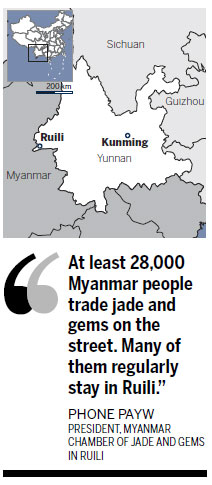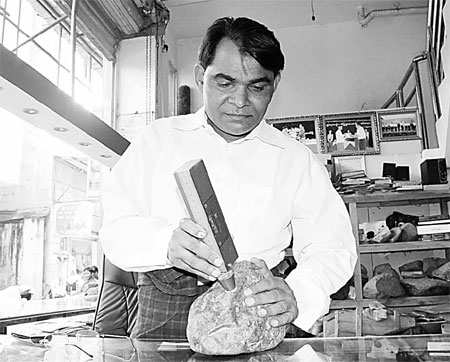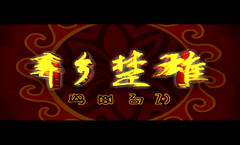No sign of jading in this lucrative living
By Hu Yongqi in Ruili, Yunnan ( China Daily )
Updated: 2013-09-30
Abundant supplies of Myanmar stone have earned fortunes for adventurous dealers
Ke Wencong left his native province of Fujian 23 years ago to make his fortune in Ruili, a city in southwestern Yunnan province that is close to the border with Myanmar.
At that time, Myanmar jade, the most popular traded item in Ruili, was extremely cheap and Ke didn't imagine that the stone would help him accumulate such a huge fortune that he now wears a jade ring worth 3 million yuan ($490,000).
Ke's family land in Jinjiang city in Fujian couldn't feed all the children, so several of them moved to other provinces to earn a living.
"If we hadn't left our hometown to search for some income, we might now be starving in Jinjiang," Ke says.
In his first 10 years in Ruili, Ke and his wife could only afford a shabby house that also served as the shop where they sold jade from neighboring Myanmar.

After 20 years of persistent work in the jade industry, all Ke's efforts started to pay off. Now Ke, general manager of Baimei Jewelry, has an impressive store in downtown Ruili to showcase jade items that are worth millions of yuan.
To expand and improve the jade industry, in 2002 the local authorities built a jade street in downtown Ruili, where each businessman was eligible for a 40 percent discount when buying a store.
Baimei Jewelry is surrounded by more than 5,000 stores that sell Myanmar jade wholesale and retail. The national-level entry port has developed a complete production chain from raw stones trade to manufacturing and sale of jade products, providing jobs for more than 50,000 people and earning annual revenue of 2.5 billion yuan ($409 million) according to the Ruili Office of Cultural Industries.
After more than two decades of development, Ruili has become the fourth-largest collection and distribution center for jade and gems in the country, following Xinjiang Uygur autonomous region and Henan and Guangdong provinces.
Located in the southern end of Dehong Dai and Jingpo autonomous prefecture, the county-level city of Ruili shares a 170-kilometer border with the Kachin and Shan states of Myanmar.
As early as 1990, raw stones of Myanmar jade were selling very cheaply. Many people from other provinces, who shared similar family backgrounds with Ke, rushed to Yunnan to make their fortune in the new business. Currently, about 90 percent of jade traders and sculptors in Ruili are from Fujian, Guangdong and Henan provinces.
Ruili was one of the most desirable places in the frontier province because of its proximity to Kachin and Shan. The nearest jade mine was just 164 km away, across the border in Lashio, capital of Shan state.
Ruili has also enjoyed huge benefits from its status as the only legal land route for importing Myanmar jade and gems into China, according to officials in Ruili.
He Tao, general manager of Jade's Jia Co Ltd, says many of the jade businessmen haven't had professional education and sometimes pay dearly if they misjudge the value of a stone.
Things have changed a lot over the years. About 10 years ago, He had to "build a close friendship" with the storekeepers in the warehouses to get firsthand information about stones on their shelves. Now stricter regulation makes transactions easier for jade traders in Ruili, He says.
The new jade street houses almost 90 percent of traders, who founded the Ruili Gem and Jade Association to coordinate more than 2,000 member factories and shops. Many traders decided to do what Ke did and settle permanently in Ruili.
In the Jiegao Jade and Gemstone Market, hundreds of sellers open their doors at about 9 am to embrace the crowds of buyers. Anyone interested in jade stones will find some to fit their needs. Prices range from several hundred yuan to more than a million yuan.
Non-professional buyers and tourists will find cheaper products, with some bracelets going for only 300 yuan. However, to the surprise of newcomers, all the shops are closed from midday until the early evening.
"The biggest advantage for Ruili is the steady supply of jade and gems from Myanmar," says Ke.
In 2010, its geographic advantage endowed Ruili with a historic opportunity to be one of three national key pilot zones for reform and opening-up. Since 1978, when Ruili was incorporated into the national key entry-and-exit points system, the local government had been focusing on promoting the jade and gem industry by fostering the complete production chain and introducing exhibitions and tourism to attract more customers.
About 11,000 participants attended the 48th Myanmar Gems, Jade & Pearl Emporium in March 2011 in Nay Pyi Taw, the capital of Myanmar. This was almost three times the previous year's crowd. The amount of deals reached 18 billion yuan, 4.5 times that in 2010.
"In that period, anyone who bought jade would make a huge profit," Ke says. "Even if one sculpture cost you 100,000 yuan, you still could sell it for 150,000 two or three months later. That was the craziest time for anybody in this industry."
The legend of easy wealth never went away and new investments flooded into the border city. In 2008, Zhou Xiaodong, a merchant in Zhejiang province, didn't hesitate to take a flight and then drive two hours to Ruili one day after he saw a TV program about Ke Wencong's legendary gambling on the quality of jade and gems.
Zhou rushed to meet Ruili's mayor and soon reached an agreement to invest 200 million yuan in Yangyanghao International Jewelry Co Ltd.
"The gambling on gems aroused the interest of my father and he immediately decided to initiate the project," says Zhou's daughter, Cai Lingyan. After graduating from the University of Edinburgh in Scotland, Cai returned home to manage the company with her husband. She is now the deputy chairman of Yangyanghao's board of directors.
After five years, Yangyanghao has the only bidding emporium for jade stones in Ruili. His most valuable stone is worth 11 million yuan. Tourists also visit Cai's factory to buy stones or bracelets.
Also on several blocks in downtown Ruili, you can see crowds of people in different clothing from about 20 countries, including Myanmar, Sri Lanka, Nepal and Pakistan. The area is called "Myanmar Street" as traders from that nation comprise the largest group.
"As far as I know, at least 28,000 Myanmar people trade jade and gems on the street. Many of them regularly stay in Ruili. The city has become our second hometown," says Phone Payw, president of the Myanmar Chamber of Jade and Gems in Ruili.
Phone Payw, who was a professor at the University of Yangon in the former capital of Myanmar, moved to Ruili in 1990 with only 80,000 kyats (then equal to about 7,000 yuan) to his name. But he was confident that the jade industry would soon go through a boom. He started with a small piece of cloth on which he laid some bracelets. Now, 23 years later, he owns three stores on the street.
About half of the more than 60,000 Myanmar traders in Yunnan sell jade and gems, Phone Payw says. "You know, my friends in Myanmar can live a good life if they earn 50 yuan a day. And if a man earns 2,000 yuan a month in Myanmar, he will probably marry a very beautiful girl."
Many Myanmar businessmen in Ruili just visit regularly, renewing their entry and exit papers each year. "They have made huge fortunes in this province as our country has superb stones," he says.
Each year, Myanmar exports about 15,000 metric tons of jade stones and 60 percent are bought by the Chinese - on the Chinese mainland and in Hong Kong, Taiwan and Singapore. More than 60 percent of jade pieces bought on the mainland are imported through customs in Ruili, he says.
Earlier this year, the Myanmar central government altered its policy and will only allow the export of manufactured jade products in the future. The new policy has attracted the attention of jade traders over the border in Yunnan, who think it will affect supply, which could then raise the price, Ke Wencong says.
The price of jade reached a record high three years ago, but amid the economic slowdown in China, Myanmar jade is no longer selling that well, even though it maintains a good price in the market, Ke says.
"We want the price to go up steadily, not surge up. In that way, we could make profits with less risk," says He. "The new policy might further drive up the price, but it's still uncertain and most traders are waiting to see what happens."
Li Yingqing and Guo Anfei contributed to the story.
huyongqi@chinadaily.com.cn
|
Phone Payw, president of the Myanmar Chamber of Jades and Gems in Ruili, checks a piece of newly bought raw stone. China has become a main buyer of jade from Myanmar. Hu Yongqi / China Daily |
(China Daily 09/30/2013 page16)


